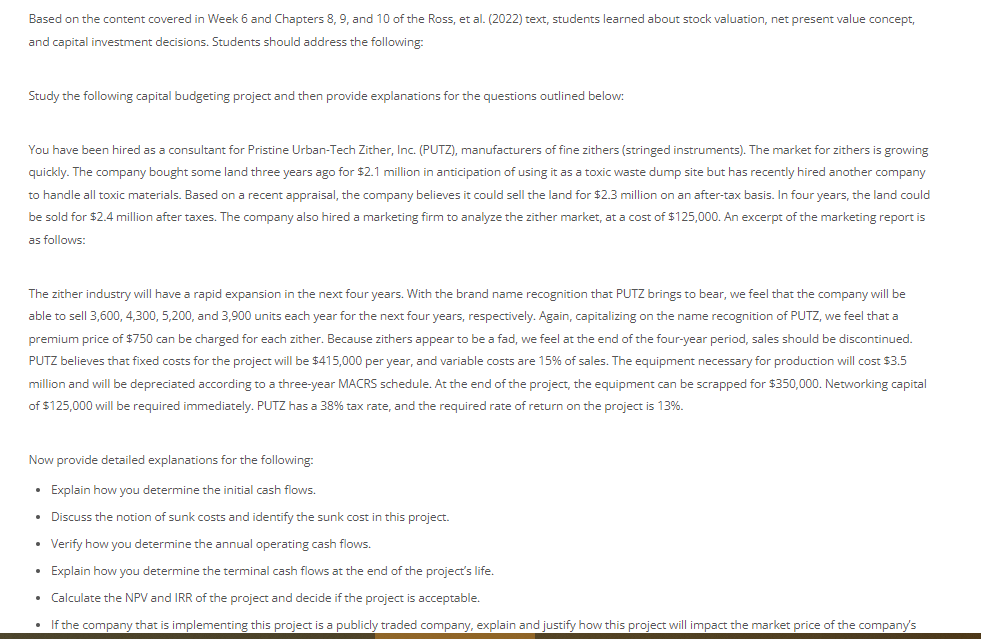
Study the following capital budgeting project and then provide explanations for the questions outlined below: You have been hired as a consultant for Pristine Urban-Tech Zither, Inc. (PUTZ), manufacturers of fine zithers (stringed instruments). The market for zithers is growing quickly. The company bought some land three years ago for $2.1 million in anticipation of using it as a toxic waste dump site but has recently hired another company to handle all toxic materials. Based on a recent appraisal, the company believes it could sell the land for $2.3 million on an after-tax basis. In four years, the land could be sold for $2.4 million after taxes. The company also hired a marketing firm to analyze the zither market, at a cost of $125,000. An excerpt of the marketing report is as follows: The zither industry will have a rapid expansion in the next four years. With the brand name recognition that PUTZ brings to bear, we feel that the company will be able to sell 3,600, 4,300, 5,200, and 3,900 units each year for the next four years, respectively. Again, capitalizing on the name recognition of PUTZ, we feel that a premium price of $750 can be charged for each zither. Because zithers appear to be a fad, we feel at the end of the four-year period, sales should be discontinued. PUTZ believes that fixed costs for the project will be $415,000 per year, and variable costs are 15% of sales. The equipment necessary for production will cost $3.5 million and will be depreciated according to a three-year MACRS schedule. At the end of the project, the equipment can be scrapped for $350,000. Networking capital of $125,000 will be required immediately. PUTZ has a 38% tax rate, and the required rate of return on the project is 13%. Now provide detailed explanations for the following: - Explain how you determine the initial cash flows. - Discuss the notion of sunk costs and identify the sunk cost in this project. - Verify how you determine the annual operating cash flows. - Explain how you determine the terminal cash flows at the end of the project's life. Study the following capital budgeting project and then provide explanations for the questions outlined below: You have been hired as a consultant for Pristine Urban-Tech Zither, Inc. (PUTZ), manufacturers of fine zithers (stringed instruments). The market for zithers is growing quickly. The company bought some land three years ago for $2.1 million in anticipation of using it as a toxic waste dump site but has recently hired another company to handle all toxic materials. Based on a recent appraisal, the company believes it could sell the land for $2.3 million on an after-tax basis. In four years, the land could be sold for $2.4 million after taxes. The company also hired a marketing firm to analyze the zither market, at a cost of $125,000. An excerpt of the marketing report is as follows: The zither industry will have a rapid expansion in the next four years. With the brand name recognition that PUTZ brings to bear, we feel that the company will be able to sell 3,600, 4,300, 5,200, and 3,900 units each year for the next four years, respectively. Again, capitalizing on the name recognition of PUTZ, we feel that a premium price of $750 can be charged for each zither. Because zithers appear to be a fad, we feel at the end of the four-year period, sales should be discontinued. PUTZ believes that fixed costs for the project will be $415,000 per year, and variable costs are 15% of sales. The equipment necessary for production will cost $3.5 million and will be depreciated according to a three-year MACRS schedule. At the end of the project, the equipment can be scrapped for $350,000. Networking capital of $125,000 will be required immediately. PUTZ has a 38% tax rate, and the required rate of return on the project is 13%. Now provide detailed explanations for the following: - Explain how you determine the initial cash flows. - Discuss the notion of sunk costs and identify the sunk cost in this project. - Verify how you determine the annual operating cash flows. - Explain how you determine the terminal cash flows at the end of the project's life







